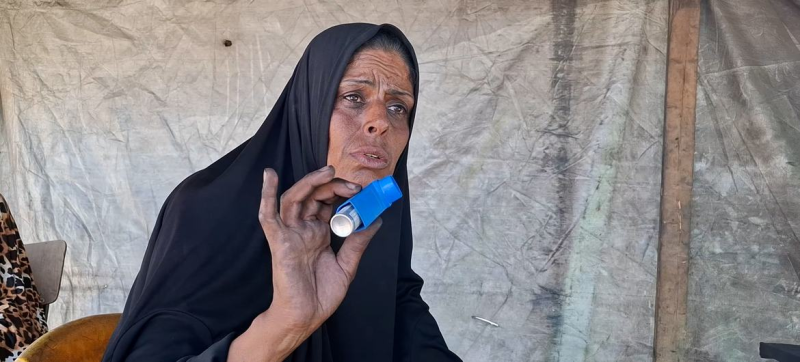- Death toll from central Israel strike rises to 5 |
- DSE sinks 138 points on broad sell-off; CSE also tumbles |
- Inside story of a roommate murder after quarrel in Dhaka |
- Jamaat condemns Khamenei’s killing, holds protest rally in Dhaka |
- Iran to pick next supreme leader in ‘one or two days’ |
Gaza Health Crisis Worsens as Families Burn Plastic

Um Mohammed Al-Masri, displaced from Beit Hanoun to the south of the Strip, working at a clay oven to bake bread and cook food for displaced people to support her family.
Doctors in Gaza are warning of a surge in respiratory illnesses as families, cut off from basic supplies, burn plastic and cardboard to cook and keep warm. They say the outbreak will worsen unless life-saving medicines, fuel, and food are allowed into the devastated territory.
Um Muhammad al-Masri, displaced from Beit Hanoun, clings to her asthma inhaler, saying she would die without it. Smoke fills her tent, where she runs a primitive furnace fuelled by trash.
“I was prescribed medicine, but I couldn’t afford it, so UNRWA gave me this inhaler,” she told UN News’s correspondent. “When I feel like I am suffocating, my children scream and rush me to the hospital.”
The inhaler is supposed to last more than two weeks, but she needs a new one every three days. “What should I do?” she asks. “I have sons and daughters to care for. I can’t afford to stop using the oven. I’m pregnant and spend the whole day sitting in front of the smoke.”
Aisha al-Ra’i, also pregnant, suffers from chronic illness yet must burn plastic daily to keep her family fed. Her daughters help collect scraps, while her husband, despite being injured, helps light the fire. “We pray that this ordeal will be lifted so we can return to our lives,” she says tearfully.
Um Muhammad Abu Zuaiter, a baker, describes similar struggles. “We’ve been baking for a year and a half, and it has caused serious health problems. I have blood pressure, diabetes, a herniated disc, and I need an inhaler,” she says. Despite suffering a stroke during Ramadan, she continues to work to feed her children.
Dr. Khalil Al-Daqran, spokesperson for Gaza’s Health Ministry, says the use of plastics in clay ovens is fuelling the spread of pneumonia and asthma. “With Israel keeping crossings closed and blocking fuel and gas, families have no choice but to use plastic and wastepaper. This has led to toxic smoke, causing widespread respiratory diseases.”
He added that hospitals cannot meet the demand due to shortages of medicines and basic supplies. “This situation requires urgent international intervention to pressure Israel to allow the entry of medicines, fuel, and food.”
As fighting continues, Gaza faces a worsening humanitarian crisis, with hundreds of thousands relying on rudimentary means of survival. The UN has pledged more aid, but obstacles continue to block deliveries at the scale required.

